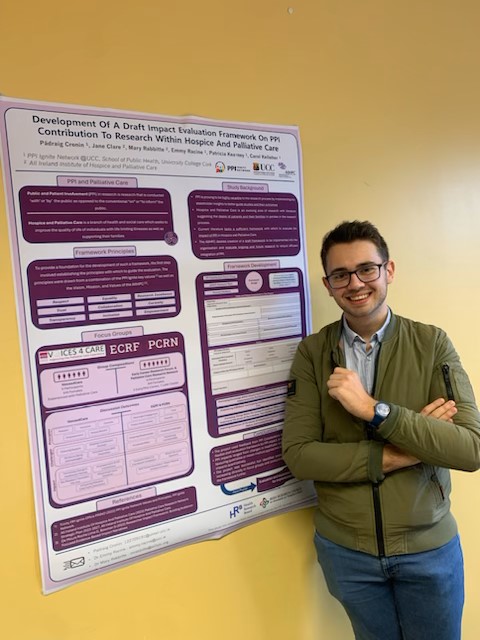In This Section
- PPI Case Studies
- PPI Resources
- Introduction to PPI
- Difference between PPI and qualitative research
- Involving children and young people in research
- PPI and doctoral research
- PPI in systematic reviews
- PPI in qualitative analysis
- Reporting PPI
- PPI in funding applications
- Budgeting for PPI
- PPI and lab-based research
- Evaluating PPI
- Events and Seminars
- Previous Summer Students
- News and Events
- About Us
- PPI Seed Funding Scheme 2023
- PPI Shared Learning Group for PhD Researchers
- PPI Ignite Network@ UCC Mailing List
- Digital Badge
 Biography
Biography
Pádraig is a 3rd year Graduate Entry Medical Student at University College Cork having previously graduated with a B. Eng in Aeronautical Engineering from the University of Limerick in 2021. Before returning to study medicine he previously worked in industry as a machine vision/automation engineer developing inspection solutions for medical device, aerospace, heavy machinery, semiconductor, and food/beverage manufacture. His research interests include measuring quality of life factors in patients suffering from neurodegeneration, and medical device development in surgical and medical applications. Having personally experienced the Palliative Care system at Marymount Hospice Cork, this studentship project entitled “Development of an impact evaluation framework on PPI contribution to research within Hospice and Palliative Care” in consultation with the Voices4Care PPI group, Palliative Care Research Network members and Early Career Researcher Forum members - All Island Institute for Hospice and Palliative Care, was an opportunity to give back to very critical system and help steer his medical training into this field.
Summer Studentship Reflection
Due to my prior academic and industry experience in the field of engineering, to date, I have been accustomed to thinking in quantitative terms, very much a numeric black-and-white approach to research which did not deviate very far from the project scope. Whilst this has been very effective at executing certain projects, it did not leave room to capture the nuances of patient-centered qualitative research, an area of my skills that I wanted to develop. This PPI research was a qualitative study that pushed me to develop this aspect of my research skills and has become invaluable in the way I approach research moving forward. Weekly meetings with my supervisor would typically start with a simple agenda which would often deviate and open my eyes to the many facets of the research we were conducting, broadening my horizons.
The core element of this study centered around gathering a group of PPI collaborators to develop the framework. Being able to meet individuals who were directly involved in the day-to-day workings of palliative care, both patients and healthcare professionals alike really exposed me to the benefits that PPI can have in research. The insights and lived experiences of these individuals opened up domains of the study that were initially blind to me due to my own perspective.
Throughout the project, I experienced several challenges that forced me to adapt and learn without delaying the project timeline. Initially, these challenges were frustrating, however, they also presented opportunities to develop myself, pushing me to think outside the box within a domain in which I had little experience in qualitative research. These specifically included generating open-ended questions to examine people’s perceptions of PPI evaluation, gathering and planning focus groups, and analysing non-numeric data in the form of focus group discussions to examine themes and trends. Overcoming these challenges forced me to adapt to a new research environment and really opened my eyes to the importance of qualitative research and how new research avenues can be extracted based on open discussions with PPI contributors.
The PPI Summer Studentship has been an incredible experience of both personal and professional growth. I have now developed a much better appreciation for the power of PPI and how it can not only improve research practice but also us as researchers, forcing us to step outside of our experiences and return to the main reason why we study, the patient. The patient and all involved from family, friends, and caregivers to healthcare workers, provide a unique insight and a wealth of knowledge which I really seek to explore in my ongoing projects and into the future as both a doctor and an academic. It reminds me of why I set out on a career in medicine and very much affirmed my reasons and ideals which I hope to bring to patients as I progress through my training.
